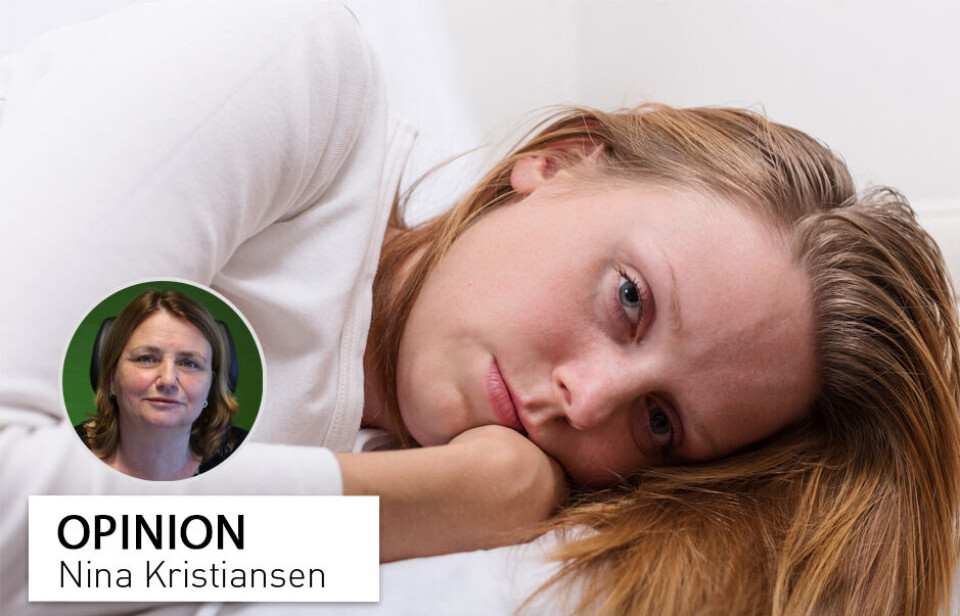
Is long Covid completely normal, a new disease, or mass hysteria?
OPINION: While some researchers explore blood and cells, others believe that long Covid is a psychological and social disease. We still lack answers.
New studies on long Covid are coming in a steady stream. Researchers around the world have tackled this new health problem: People who do not recover after Covid-19.
Let me state right away: Researchers and doctors agree that those with long Covid are not healthy. The symptoms are real. Many struggle for a long time after a Covid-19 infection.
After four to six weeks of continued complaints, doctors can diagnose ‘long-term symptoms after Covid-19’.
It affects 10 to 30 per cent of those who have had Covid-19.
But what causes long Covid?
Well, no one knows yet. But there are theories. They can be divided into three.
Theory 1: Normal that some struggle
It is quite common for some to take a long time to recover from infections. This applies to all types of infections, not just Covid-19.
It particularly affects three groups: the elderly, those with other pre-existing conditions, and those who are already exhausted before viruses or bacteria knock them out.
In that sense, long Covid is nothing new.
This also happens after other types of respiratory infections, as shown by a British study. It revealed many similarities between those with long Covid and those who take a long time to recover from colds, bronchitis, or mono.
In several studies, participants with long Covid were tested and it turned out that they never had a Covid-19 infection. This reinforces the argument that social factors play a role.
It often happens to those who get lung failure from a common flu. Many of them suffer from long-term effects like poor lung capacity, anxiety, depression, and a body where muscles and the mind don’t function as they used to.
It has also happened before, such as after the Spanish Flu, a major influenza pandemic a hundred years ago.
When this occurs following other infections, it's not surprising that it happens after a Covid-19 infection.
The Norwegian Institute of Public Health adheres to this perspective. They write that Covid-19, like other infectious diseases, can cause post-infectious symptoms.
Theory 2: New virus, new disease
Many researchers are trying to find out if something has happened in the bodies of those who have long Covid.
- In one study, they scanned the brains of people before and after they were infected with Covid-19. The brains had shrunk by 0.7 to 2 per cent, especially in areas related to the sense of smell. The researchers note that the changes are small, that they do not know if they will resolve, or if they have any significance.
- Another study found that the spinal fluid of 17 patients with brain fog contained higher levels of proteins than usual, suggesting potential brain inflammation. However, more research on a larger population is needed, the researchers concluded.
- The coronavirus may also have caused brain cells to fuse together. This study used very high doses of the virus, making the results uncertain.
- Other researchers have found abnormal values in blood and cells. They speculate that the issues might be caused by the immune system, lingering active Covid-19 virus in the body, or the virus triggering other viruses.
- Many with long Covid have problems with coughing and breathing. Therefore, researchers have investigated whether the virus can damage the lungs. It is also possible that the virus damages the liver, kidneys, and spleen.
- Diarrhoea and intestinal problems are symptoms of long Covid. Some researchers are exploring whether the Covid-19 virus changes the gut microbiota.
- Some researchers believe that long Covid and myalgic encephalomyelitis (ME) are so similar that the long-term effects of Covid-19 might actually be ME. They are looking into body inflammations caused by an activated immune system and how cells produce energy.
Most viewed
Currently, these studies are small and the results are uncertain. Without more knowledge about exactly what happens in the bodies of those with long Covid, treatment remains challenging.
Theory 3: Long Covid as mass hysteria
Then there are researchers who suggest that long Covid is more about negative expectations and social contagion.
Early in the pandemic, media reports on long Covid emerged. People discussed its aftereffects on social media. This may have made people more aware of symptoms. Isn’t my memory worse now? Am I not struggling more with concentration? Don’t I have more back pain?
In several studies, participants with long Covid were tested and it turned out that they never had a Covid-19 infection. This reinforces the argument that social factors play a role.
Two Canadian researchers went through a series of studies on long Covid and concluded: Long Covid is a psychosomatic disorder, meaning real physical ailments without a medical cause. Long Covid comes from the nocebo effect and excessive focus on symptoms and aftereffects, they believe.
The nocebo effect is based on the concept that our beliefs can make us feel sick or exacerbate our pains if we expect or fear that they will worsen.
The brain plays a crucial role in this process. It goes on standby when we fall ill, interpreting what is happening in the body and what might happen next. But the brain is not always right. Despite this, it can still activate the immune system, hormones, and nerves, leading to various symptoms.
Doctors are often unprepared to deal with the diverse and numerous symptoms presented by patients.
The two researchers believe that healthcare personnel and authorities are partly to blame for the widespread cases of long Covid because they pumped out information about possible long-term effects.
These researchers call long Covid a mass sociogenic illness, a type of ailment where symptoms spread in society as individuals share their fears and experiences and start to self-examine more closely. This phenomenon is also known as collective anxiety or mass hysteria.
There are many other researchers who believe that social and psychological factors contribute to long Covid, even if they do not go as far as these two Canadians in their conclusions.
A challenge for all researchers
Numerous studies on long Covid focus on identifying common characteristics among those affected. This approach aims to simplify the search for causes, whether they lie in the brain or elsewhere in the body.
Those who had a severe case of Covid-19 are more likely to have long-term effects. But those who had mild Covid-19 can also suffer from severe long Covid.
Women and older individuals get long Covid more often. So do those who were not well before they were infected. A large study of 55,000 Americans showed that 60 per cent of those who got long Covid were stressed, anxious, lonely, or depressed before they got Covid-19. Those who were particularly worried or fearful about Covid-19 were more likely to suffer from long Covid.
The challenge is that these groups encompass a large portion of the population, including women, older people, and those in poor health. This makes it difficult to identify specific risk groups for long Covid.
The uncertainty of treatment options
Long Covid is not easy to treat.
Long Covid patients around the world have reported up to 200 different symptoms. Some of them are similar, like fatigue, exhaustion, brain fog, and poor memory. But coughing, heart palpitations, dizziness, anxiety, depression, and muscle pain are also common.
Doctors are often unprepared to deal with the diverse and numerous symptoms presented by patients.
This can lead to doctors downplaying the symptoms and complaints, which in turn makes the patient frustrated, as noted by two American doctors and researchers.
Despite so many being affected, despite the research, we still don’t know what causes long Covid.
Often, other diseases must be ruled out. This can lead to patients feeling that they are not believed when they themselves think they have long Covid.
Good interactions between doctors and patients are some of the most important factors in alleviating and healing long Covid, according to the two American researchers. Doctors can do a lot to reduce fear in patients, provide reassurance, eliminate guilt over not being fully recovered, and identify symptoms that can be treated.
In Norway, those most severely affected are offered rehabilitation. Others receive advice on exercises, rest, and gradual physical training. Medication may be a future possibility – or not.
In the meantime, the health issue of long Covid is growing. the long covid health problem is increasing. It is costly for the many who are affected and for health budgets worldwide.
Despite so many struggling and despite all the research, we still don't know what causes long Covid.
Researchers might find something in the body that answers whether this is a new type of illness. But for now, we are left with the reality that some people take a long time to recover from infections. And that the brain can exacerbate the whole situation.
———
Translated by Alette Bjordal Gjellesvik
Read the Norwegian version of this article on forskning.no







































